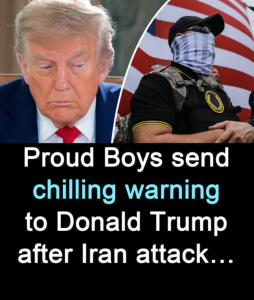In a surprising turn that highlights shifting loyalties within Donald Trump’s support base, members of the far-right group known as the Proud Boys have recently declared that they would withdraw their support for the former president if he moves forward with engaging the United States in a war with Iran. This unexpected stance has sent ripples through both political and extremist circles, raising questions about the evolving priorities of Trump’s most radical backers.
Traditionally staunch supporters of Trump, the Proud Boys have often aligned themselves with his nationalist, anti-establishment rhetoric. They have stood by him through multiple controversies, criminal indictments, and the aftermath of the January 6 Capitol riot—an event that led to the group’s increased scrutiny and legal troubles. However, their recent statement suggests a hard line when it comes to foreign wars, particularly involving the Middle East.
Speaking through social media channels and encrypted platforms, several prominent Proud Boys figures expressed disillusionment over the idea of the U.S. becoming entangled in another foreign conflict. One message read, “We didn’t support Trump so he could become another war hawk. If he sends American soldiers to die in another desert, he’s no better than Bush or Biden.” Another comment added, “Trump promised America First. War with Iran is globalist nonsense.”
Their opposition stems largely from a broader anti-interventionist stance, which has gained traction among parts of the far right in recent years. While this ideology was once associated with the political left during the Iraq War era, it has increasingly found a home in populist and nationalist circles that believe in focusing American resources inward rather than abroad.
The Proud Boys’ threat to withdraw support could have implications for Trump as he navigates a volatile 2024 election landscape. With multiple legal challenges and a deeply divided country, Trump is relying heavily on his base to maintain momentum. Any fracture—even among fringe groups—could signal cracks in the once-solid wall of loyalty that defined his presidency.
Critics argue that the Proud Boys’ conditional support is opportunistic and driven more by image than principle. Nonetheless, the group’s warning exposes a growing tension within the Trump movement between hawkish foreign policy and America-first isolationism. It also complicates Trump’s potential decisions regarding Iran, especially in the face of rising tensions in the Middle East and pressure from traditional conservative defense hawks.
For Trump, the dilemma is clear: engage in a show of strength abroad and risk alienating his most fervent supporters, or maintain a policy of restraint and risk being viewed as weak in the face of foreign threats. As geopolitical conflicts escalate and election season intensifies, Trump will have to weigh every move carefully.
For now, the Proud Boys’ message is blunt and uncompromising: war with Iran is a red line. And if Trump crosses it, they claim he’ll lose their backing—a warning that underscores just how fragile and conditional political loyalty can be, even among the most die-hard supporters.
